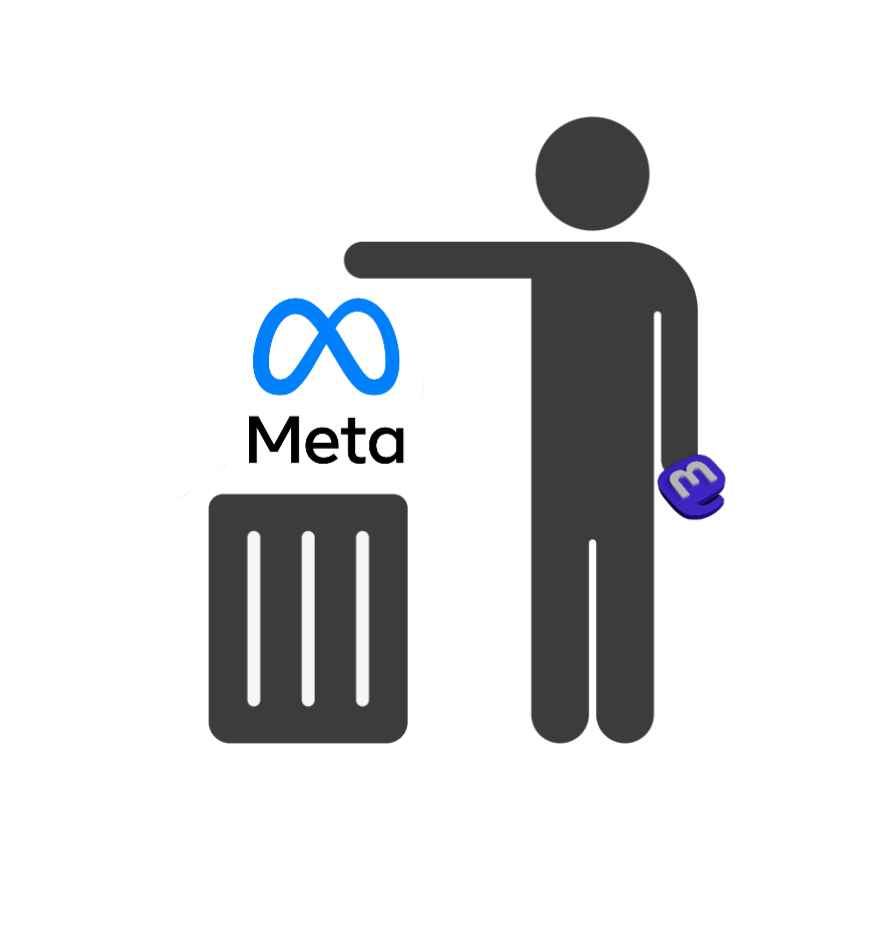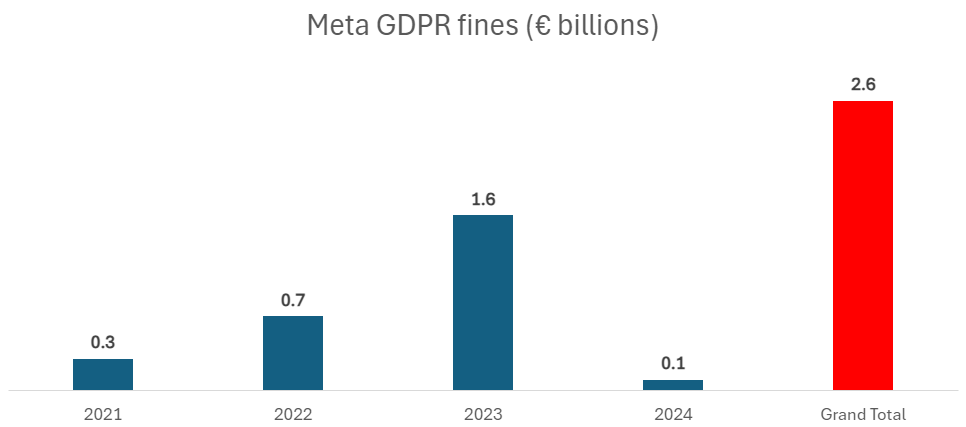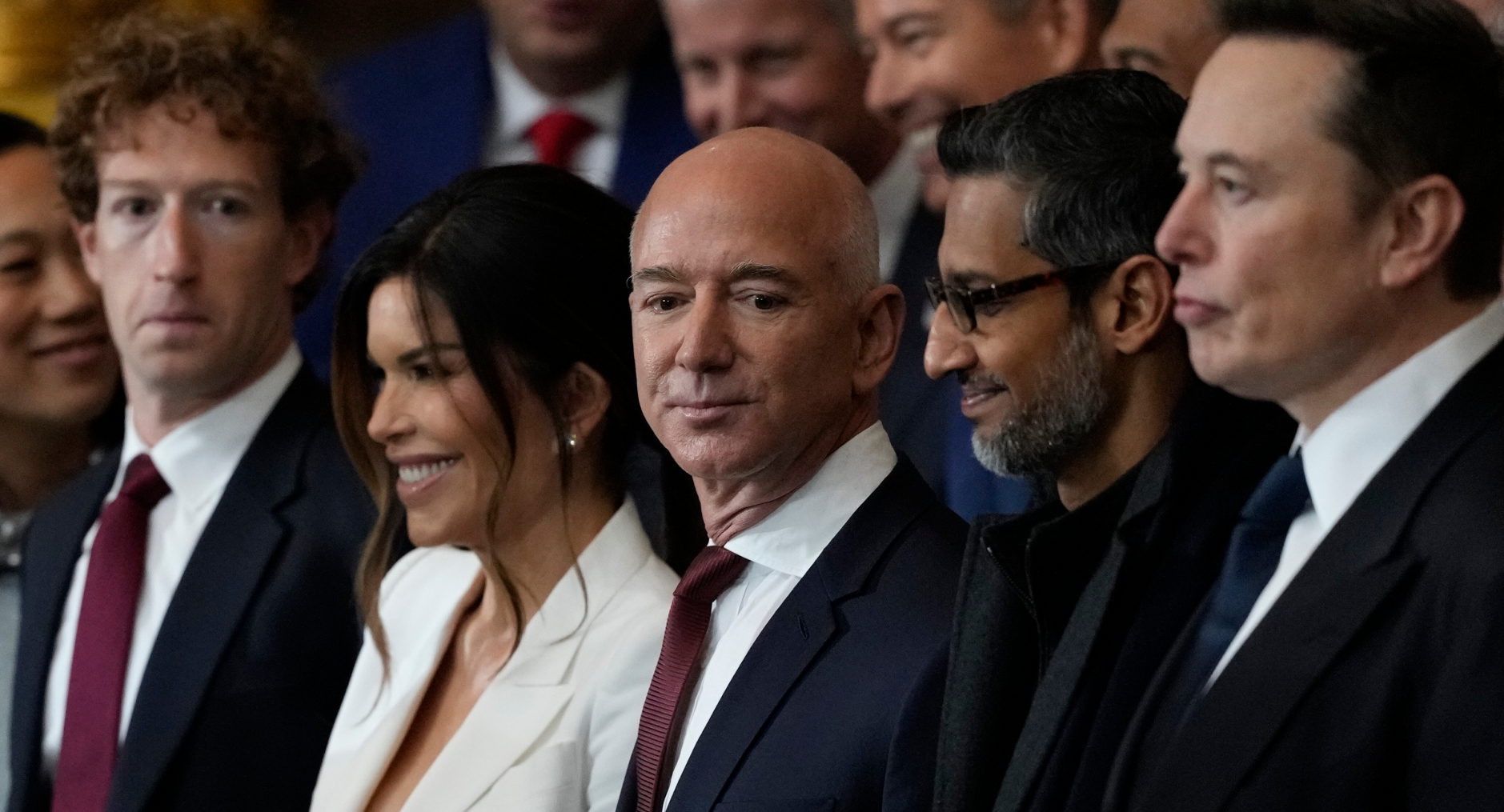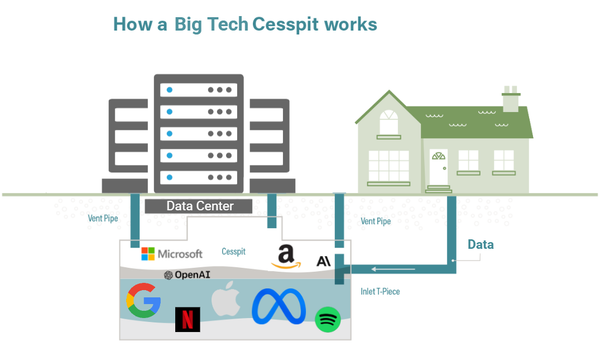Know Your Enemy - pt 2: Meta
This is the second in a series of blog posts to inform you about the main players in big tech, and why they should be avoided.

If Google invented surveillance capitalism then Meta ran with it and boosted it to new levels. Google try to be 'everywhere' on the internet by making dozens of products that surveil you. Meta (full name Meta Platforms), parent company to Facebook, WhatsApp, Instagram, Quest VR and Threads, instead rely on entirely ignoring privacy regulations by surveilling everything in their apps AND following you around the internet with creepy trackers. Why? Because they are not really a social media business, they are an advertising business.
By the time you've finished reading this article you will understand what kind of company you are dealing with, what the far-reaching implications are, and you will hopefully want to stop using their products. Don't worry there are alternatives!
I had a Facebook account until 2024, when I deleted it. I had long since deleted everything from it and not used it since 2017. I never had an Instagram account. The only product I still (reluctantly) use is WhatsApp, but as part of the Big Tech Walkout 2025 I will be deleting that by the end of this year.
Billionaire Watch: who owns / runs Meta?
Mark Zuckerberg - CEO

Due to a control-freak share structure, Mark Zuckerberg is not only the CEO, but still has the largest amount of 'voting' shares. This means that despite taking the company public and almost 80% of regular shares being owned by institutional investors, he still runs the company with final say on every decision they make - unopposed. Come back and read that sentence again when you've finished this article.
His Net worth as of 2025: $251 billion
The rest of the top management and board of directors are listed here. Most notable though is former COO Sheryl Sandberg, who led Facebook's transformation into a surveillance advertising business. Her net worth in 2025: $2.4 billion.
Company size
Meta has a share cap (like net worth for companies) of $1.84 trillion. That's bigger than the GDP of some countries e.g. Australia $1.83 trillion or Netherlands $1.32 trillion.
Particularly significant is Meta's size relative to the European country they are regulated in, Ireland. Ireland's GDP is only $0.6 trillion (so Meta is over 3 times the size). It's no surprise that enforcement of regulation has been lax over the years. and has only become worse in 2025 when Ireland appointed an ex-Meta lobbyist as the head of the Irish DPC (Data Protection Commission).
Business model - advertising
Meta as a group of companies makes 97.8% of its total revenue from advertising. Meta, like Google, plays both the buy-side and sell-side role for ads by running it's own advertising network, Meta Advertising. This is classic monopolistic practice from both companies. Ref: https://en.wikipedia.org/wiki/Meta_Platforms
Brief history of Meta
Founded in 2004, it was a rival to MySpace. But before that it grew from a project called Facemash that Zuckerberg built while at Harvard. A copy of Hot Or Not, it took the yearbook photos of students and invited users to vote on who was 'hotter'. And it terms of the morals upheld by the company over the years, and privacy concerns, it was downhill from there.
MySpace had been doing fairly well by 2005 so Zuckerberg used dirty tactics to get people over to his platform. He built bots that would allow a MySpace user to have their contents there scraped and transferred to Facebook.
That helped but mostly they won out by adding to Facebook anything people were into, from mobile games to groups, to dev-friendly tools and a seemingly never ending slew of new features. We all remember Facebook at the beginning - new, amazing, fun, addictive. Lets look at how it developed over the years:
Timeline of Facebook/Meta milestones
The following information is mostly taken from this Wikipedia article (Items marked BUSINESS were in the background and would not have been seen by 'users')
- News feed launch - 2006 - using their algorithm to serve up 'news' from your friends
- BUSINESS Facebook Beacon - 2007 - sends data from external websites to Facebook
- 'Like' button launch - 2009
- Facebook Groups launch - 2010
- Full launch on mobile devices - 2011 (the same year that Russia started its influence campaign in British politics). And in 2011 Google launches Google+
- Buys Instagram - 2012 - to prevent them competing; immediately updates Terms of Service so they can sell people's photos to third parties without consent; also shortly after the acquisition targeted advertising was inserted into Instagram
- BUSINESS 1 billion monthly active users - 2012
- BUSINESS Custom Audiences - 2012 - advertisers can micro-target specific people based on their requirements
- BUSINESS Facebook IPO ('going public on the stock exchange') - 2012 - valued at $104 billion
- Adds many more emoticons as 'reactions' - 2013 - allowing finer micro-targeting of ads
- Video autoplay added to Timeline - 2013 (addictiveness)
- Buys WhatsApp - 2014 - to prevent them competing
- Buys Oculus VR - 2014 - Zuckerberg's obsession with VR, no doubt for the unlimited data harvesting in virtual worlds
- BUSINESS Launch of Facebook Pixel - 2015 - embedded in websites, how Meta tracks you around the web
- BUSINESS Experiments with AI assistant 'M' - 2015 - now coming to fruition with Meta AI in 2025
- BUSINESS News Feed update -2016 - user 'time reading the article off Facebook' will be tracked and used for advertising data
- Facebook Live widely available - 2016 - and FB starts pushing live content more in its algorithm; also released on Instagram (addictiveness)
- Marketplace launched - 2016
- Instant Games launched - 2016 - in Messenger and Facebook (addictiveness)
- Zuckerberg "The future is private" - 2019 - an attempt to heal their shattered reputation (what a load of bollocks)
- Did not remove Trump post inciting violence - 2020 - (disputing the election result) which led to the Capitol Hill riots.
- Puts AI chatbots in all products - 2025 - they are creepy and Meta is caught deliberately allowing them to have sexual conversations with children
Privacy Policy timeline
Nobody reads the privacy policy. If they did, they would not use Meta's products willingly. Like Google, their privacy policies are unnecessarily long and complicated. They essentially offer a Faustian bargain - accept surveillance or don't use the product. There is no true consent. And it has become worse over time:
- 2005-2010 - This interactive graphic shows nicely how user private data was exposed more and more over this period. The 2010 update to the policy saw it clock in at 5830 words! It saw Facebook start to offer user data to third party websites and services
- 2011 - 2018 - This article neatly tracks the early years degradation of Facebook's privacy policy.
⚠️ The worst parts are: 2014 they straight out stated that they could do what they want with user data; 2015 making billions of user profiles publicly searchable; 2017 it was found that the Facebook website tracks user web activity even when they're logged off from Facebook - 2021 - WhatsApp update - revealing that WhatsApp data would be shared with Facebook. This is what pushed a LOT of people off WhatsApp and over to Signal. This study saw this as evidence of people breaking free of the 'network effect'.
- 2023 - WhatsApp - revealing a new 'legitimate interest' loophole in GDPR for Meta to collect your data from WhatsApp, following a ruling against them by the Irish DPC
- 2025 - Meta global policy - revealing that their AI will scrape everything and sell targeted ads based on your interactions with AI chat bots
Meta scandals
Instagram and sale of drugs - 2013
BBC investigation finds that Instagram is being used to sell drugs. Users would post photos of the drugs and complete the transaction on WhatsApp. Note that WhatsApp was still independent then, and I suspect this Instagram/WhatsApp combo would have piqued Facebook's interest - they don't care how the 'engagement' is generated, they just want the money.
Facebook Trending Topics bias - 2016
Reported originally by Gizmodo: and referenced here. They regularly suppressed right wing content in users' news feeds.
The Guardian Facebook Files - 2017
Guardian articles showing that FB moderation is terrible, and e.g. child abuse and sextortion content is rife. This shows that while FB say in public that they 'have made improvements to their content moderation' in reality they don't care - anything that increases 'engagement' is good for advertising income.
Russian influence campaigns - 2016 - Brexit and Trump
Facebook claimed in 2017 to have 'found' Russian accounts buying ads to post propaganda but only after the FBI began an investigation into the Trump election. FB did not care, as reveled in Careless People, the book by former FB employee Sarah Wynn-Willaims. In fact Mark Zuckerberg, after finding out about how his social network was being misused by Russia, took an interest in politics and considered running for election, rather than trying to reduce the problem.
The brexit connection was never proved, due to the Russian Report being buried by Boris Johnson, but interference has been determined by The Citizens' excellent investigative podcast: https://the-citizens.com/2025/02/sergei-and-the-westminster-spy-ring/
Cambridge Analytica scandal - 2016 (revealed 2018)
Carole Cadwalladr revealed that Facebook had sold out 87 million of its users to data analytics firm Cambridge Analytica, whose purpose was to influence elections. This scandal never leaves Facebook, prompting them to change their name to Meta in 2021. The scandal knocks $50 billion off their market cap.
Dark ads and fake news enquiry (UK) - 2018
Zuckerberg didn't even turn up as UK MPs questioned his CTO instead about disinformation. They demonstrated that they just. don't. care. This is corroborated in senior Meta insider Sarah Wynn-Williams' excellent 2025 book Careless People
The Great Hack (documentary) - 2019
This excellent documentary shows you the whole story of the Cambridge Analytica scandal. It is available on Netflix. What's the 'hack' in the title? Democracy.
WhatsApp and Facebook GDPR fines - 2021 onwards
When Ireland's DPC finally started enforcing the GDPR on Meta, the fines came thick and fast e.g. Transferring data from Europe to USA - 2023 - The Irish DPC (after pressure from the European Commission) fined Meta €1.2 billion.

The Facebook Files leak - 2021
Frances Haugen leaked thousands of internal documents showing that Meta's top management know how to make their products safer, but choose not to. Instead they prioritise profits. This is corroborated by the revelations in the book Careless People (2021) by Sarah Wynn-Williams (see below) - that Meta's management are utterly indifferent to the harm their products cause, and they only care about money.
Investigation about drug sales on Meta's platforms - 2024
Because drugs = engagement. Fox news article about Meta drugs problem.
Investigations into child safety on Meta's platforms - 2024
References: BBC article (too addictive), Guardian article about EU investigaton into Meta's effect on mental health & AP News article about EU investigation into Meta child safety measures (too addictive and bad for mental health).
Can't Look Away (film) - 2025
Heartbreaking documentary about the deaths of children due to social media. Instagram and Facebook contribute directly to deaths due to the 'down the rabbit hole' nature of their recommendation algorithms.
The parents won their first milestone in the case and it is ongoing. A must-see if you have children.
Careless People (book) - 2025
A must-read tell-all from a very senior member of Meta's leadership team, Sarah Wynn-Williams. She exposes the top management (Mark Zuckerberg, Sheryl Sandberg, Javier Olivan, Andrew Bosworth etc) as callous and utterly uncaring about the negative effects of their products. She also reveals that, contrary to what the company said publicly, Meta targeted depressed teenage girls based on their mood (to sell them beauty products).
There are many revelations in the book, and you really should read it yourself - it's a gripping page turner. Perhaps most telling was Mark Zuckerberg's reaction to finding out that Facebook was used to swing the Brexit vote and the Trump 2016 election (ref: chapter 37). Instead of alarm he was quietly fascinated. It is no surprise that someone with the billionaire mind virus would be attracted to such power. He started making moves like he was going into politics - clearly letting his already problematic god complex grow. All these years later thank goodness we don't have president Zuckerberg, but the way the tech bros have amassed such staggering wealth, and aligned themselves with political power, amounts to almost the same thing.
And with AI they are trying to push their power further - I recommend you read the book Empire of AI to understand how the race to build AGI is old-fashioned colonialism in new clothes. Think of those in the Global South who suffer so you can generate that funny picture. And think of how monopolistic the AI race is: their insistence that scale is the only way to more powerful models effectively locks out smaller competitors.
Enshittification
A glance at the milestone timeline above shows clearly the move away from innovation towards enshittification. As more and more people piled in (now referred to as 'users' - appropriate for the deliberately addictive qualities they would add to Facebook), they realised that they had them trapped due to the network effect. This is when you feel that you cannot leave the platform because all your friends are there and you don't want to lose contact.
Facebook could then turn to its true business function - advertising - and service its business users. A great example of this is the 'Facebook Pixel' (now called the Meta Pixel). This is promoted to businesses as a small piece of code that you add to your business website and it lets you track the effectiveness of your Facebook/Meta ad spend. Sounds harmless and good, right?
The dark side of the online advertising business model
As with Google, if that was all it did then, yes, it would be a harmless business tool. But it's not.
- The Meta Pixel and Facebook Like buttons in websites, and Facebook trackers embedded in mobile apps, enable Meta to track user behaviour all over the internet - to further replenish the profiles they keep on us.
- And of course if you've read our last post in this series then you'll already know that micro-targeted advertising has spawned the RTB system (Real Time Bidding) and this amounts to the biggest data breach of all time.
Read more about the RTB system on our website .
- And of course Meta are harvesting all your really personal information into the creepy profile they hold on you in a data center somewhere: who your friends are, exactly what you like, what mood you're in (inferred by their AI-powered algorithms), what products you are interested in, what books you read, what films you watch, and (worst of all) what your political and social opinions are. These last two are revealed in your likes and reactions to posts on Facebook and Instagram, and corroborated by your activity on WhatsApp. All this knowledge about you makes you very easy to influence, something governments worked out early on, but thanks to the RTB system now anyone can do it.
WhatsApp and its half-way encryption
"But WhatsApp is End to End Encrypted!" you say. That is only partially true. The contents of your messages are encrypted, but everything else is not. i.e. the 'metadata' is not. Sadly most people do not understand the predictive power of metadata. In fact they don't usually know what metadata is. It is 'data about data'.
So for example when you take a picture with your phone the image is the contents, and the metadata would be other information baked into the file such as your location at the time, the time of day, and details of the phone/camera that the picture was taken on. Similarly when you're typing up a document in Word, there is metadata that shows who the author is, what the file size is, how many words are in the document, and when it was last edited (and by whom).
(For a quick way to understand the power of metadata, watch this clip of the former head of the USA's NSA and CIA services saying "we kill based on metadata".)
When you send a WhatsApp message, Meta cannot read the contents of the message, but the metadata reveals:
- who you are talking to
- what time of day it is
- what your physical location is
- how long the conversation is
- whether images were sent or not
- the contacts of the other person
- your contacts
Perhaps you think that's not so bad? Well now consider that this info is used to 'corroborate' or triangulate the other info they harvest about you from Facebook, Instagram or Threads, (and from your web activity they track) to complete the creepy profile they build on you, and use it to sell access to you by advertisers. And as we noted above, leaks out into the world via the RTB system. Just your location data alone should be enough to freak you out. If it doesn't - please get in touch: I would genuinely love to know why.
Do you trust Meta with your keys?
One key 'feature' of WhatsApp (and iMessage for that matter) is that they also handle your encryption keys. This undoubtably makes life easier for people (messages can be easily restored/ported to another device) but it also means that ultimately the keys to your encrypted messages are owned by people who you cannot trust (i.e. Meta).
And sure enough in a lawsuit against Meta it has been alledged that Meta actually can see your message content, and they scan it for their advertising and AI business, and for security agencies.
Cosy with governments
Security services
Facebook was always happy sharing user data with the CIA and FBI. This was not unique to them, all the big tech firms were at it, as revealed by Edward Snowden in 2013. Meta's current closeness with the Trump administration should raise questions about how much worse the data sharing is now. You may have read about this before and thought "that's ok, it's my government" but just consider the logic that it's only ok if you trust your government. Perhaps the next (or current) administration will misuse your data.
Lobbying
In order to evade being regulated Meta has spend staggering amounts of money lobbying governments around the world: $5.8m in the US in just one quarter of 2025, and $13.6m in the first half of 2024. In the EU in 2023 Meta spent €8m.
Meta's headquarters are located in Ireland, so that is where they are regulated for the EU jurisdiction. Sarah Wynn-Williams revealed in her book Careless People that the Irish government was especially close to Meta, even giving them a 'special phone':
"Sheryl (Sandberg) often tells the story about how she decided to locate the Facebook European headquarters in Ireland in 2008, after the Irish government gave her a special phone when she landed in the country on her first business trip. The phone connected her to someone in the Irish government who could solve any problem or address any accommodation she needed."
Meta tried to silence Wynn-Williams for this and other disclosures, as reported here.
It is also telling that in October 2025 Meta appealed to the Irish government to help stop them being regulated under the Digital Markets Act, an EU rule that kicked in recently

And of course it's hard to miss big tech's swing to the Right when Trump was elected again. But the big tech bros are fickle - and will side with whoever can regulate them less, so they can increase their own power and money.
Data centers and environmental costs
Various reports have revealed the true costs of Meta's giant data centres, e.g. here and here. Their current use of drinkable water for cooling (yes, it has to be drinkable quality) can be around 500,000 gallons per year but this is set to be much larger in the near future, according to this 2024 report. Those findings are summarised more clearly in this article, which reveals that due to the AI hype bubble "in 2023, U.S. data centers consumed 17 billion gallons (64 billion liters) of water directly through cooling, and projects that by 2028, those figures could double – or even quadruple.". For context that article compares a typical large data center's water consumption to human water consumption: "in 2024, one data center in Iowa consumed 1 billion (3.8 billion liters) gallons of water – enough to supply all of Iowa’s residential water for five days."
In terms of electricity consumption this article reveals Meta's plans for a 4 million square foot, 2GW data center 'campus' in Louisiana.
In the UK Foxglove's legal case against the UK government to raise awareness has shown that data centers can guzzle between 4 and 19 million gallons of drinkable water per day. See our previous post about Google for more info on data centers.
Worse than you thought: Meta horror stories
Mind-boggling scale of influence
The ability to influence at global or even national scale is power that no one should wield. Meta have 3 billion users at the time of writing, which is 65% of the world's voting age population. The problem with Facebook is that not only does Meta hold that power (e.g. the 2014 contagion experiments, or when it was caught manually changing what went into users' Trending feeds), but it puts that power into the hands of anyone willing to spend enough money on articles (fake news) and ads.
Meta's products use 'engagement-based' AI-powered algorithms to power their news feeds. The longer a person stays looking at Facebook or Instagram the more money Meta makes from the ads that are shown there. So 'engagement' is really the only metric they care about. And they don't care how they get it. If it sends millions of people down rabbit holes into a polarizing echo chamber, so what. But what about genocide, would that be a problem?
Real influence, real tragedy - case study: Myanmar genocide
Maybe the 3 billion number, or '65% of the world voting age population', isn't real enough for you.... just numbers. Well instead consider what happens when a government wields that influence power: the Rohingya genocide in Myanmar in 2017.

Myanmar got the internet and mobile phones at the same time, skipping the desktop phase. Facebook came pre-installed on those phones, so for the everyone in Myanmar, Facebook was the internet. The Rohingya people are a minority Muslim group in Myanmar, which is majority Buddhist.
Since shocking content 'juices' the Facebook algorithm (more engagement, remember) it was relatively easy for the Myanmar military and radical Buddhist groups to flood Facebook with anti-Muslim content. They spread disinformation that there was an impending 'Muslim takeover'. This stirred up fears and turned people on each other. When the government decided to launch its crackdown, the majority population were primed and ready for violence. The death toll was somewhere between 25,000 and 42,000, and 700,000 have been displaced from the region.
Kids, algorithms and a twisted take on the term 'assisted suicide'
Perhaps you live in the West and Myanmar doesn't feel relevant to you. Well guess what, since 2018 Meta's algorithms have got worse and they're now more actively targeting children. Why? Because they've pretty much maxed out on adult users, so they turn to the 'child market' for 'engagement growth'.
And as the 2025 documentary Can't Look Away so tragically showed, Meta's apps are literally pushing kids towards suicide. Sounds overly dramatic? No, it's fact, and there are thousands of cases. Their algorithms are finely tuned to pick up on certain key words and behaviours and channel that child down a rabbit hole of content.
One horrific example in the documentary was a cheerful, healthy and sporty boy in high school who had just been dumped by his girlfriend. It happens all the time at that age. Usually you mope around for a bit and eventually get over it.
Unfortunately not this poor boy, who was sucked into a vortex of suicide-promoting and destructive thought reinforcing content on Instagram. It took a frighteningly short time for him to be convinced that he should break into his father's gun cabinet and shoot himself with a handgun.

Another case showed how a boy was 'sextorted' by a predator posing as a teenage girl, and the boy ended up taking his own life. He was merrily helped to his end by a slew of suicide-friendly content courtesy of Meta's toxic recommendation algorithm.
Sensual AI chat bots aimed at kids
Just at the point when you think Meta couldn't get any worse, in the moral sense, they go and release their AI chat bots in 2025. They are soon caught having deliberately allowed these chat bots to have 'sensual' conversations with children. I mean, what the actual f%^k?
And you're wrong if you think your child has to download the Meta AI app to access these chat bots. They've put them into WhatsApp! And not only that, but they've employed a 'dark pattern' to get people to use them - by mixing the AI chat bot typing bar into the search bar. So you are searching for a contact and inadvertently end up talking to a creepy AI chat bot. ffs.
How is this acceptable?

In what universe are we allowing products to be used by the public that have such a dangerous downside? Do you think a type of food product that killed thousands of people would be allowed to stay on shelves? Would we just say "it's ok because I really like it and I haven't died yet"? No, of course not. Industry regulations would not allow it.
Sadly big tech have lobbied so hard over the years that they have avoided any kind of real regulation, as explained here.
In that respect social media has more in common with the tobacco industry.
Zoom out - it's not all about you, it's global
Meta's products may be very convenient, but stop for a second to consider global user numbers:
- WhatsApp 3 billion
- Instagram 3 billion
- Facebook 3 billion
Big numbers are hard to get your head around, so if you know that the total world population is roughly 8 billion and according to this website those of voting age would be about 4.6 billion, then you can see that Meta has detailed info on 65% of the world population of voting age! (Assuming Meta's number to be 3 billion).
Conclusion
"Convenience has eaten the world; Google and Meta are at it's core." - brenetic
You can now see that there are many reasons for ceasing to use their products: addictiveness and time wasting, susceptibility to influence and control, echo chambers and political polarisation, worsening products with more and more ads, threatening the personal safety for you and your children, genocide, proliferation of disinformation and AI slop, wealth inequality and the growing power of Meta as a giant tech firm, increased power of individual billionaires and their increasing role in politics, or the staggering environmental costs of AI data centers.
But for me a particularly important reason to avoid Meta, and big tech in general, is the threat to democracy that their business model (surveillance capitalism) and their algorithm-driven products pose. I've detailed above how Meta's social media and leaked user data can be used to distort the democratic process, but that's not the full extent of it. Here I'll quote Professor Shoshana Zuboff from her book The Age Of Surveillance Capitalism, chapter 18, in the section Surveillance Capitalism and Democracy:
"Surveillance capitalism arrived on the scene with democracy already on the ropes, its early life sheltered and nourished by neoliberalism’s claims to freedom that set it at a distance from the lives of people. Surveillance capitalists quickly learned to exploit the gathering momentum aimed at hollowing out democracy’s meaning and muscle. Despite the democratic promise of its rhetoric and capabilities, it contributed to a new Gilded Age of extreme wealth inequality, as well as to once-unimaginable new forms of economic exclusivity and new sources of social inequality that separate the tuners from the tuned. Among the many insults to democracy and democratic institutions imposed by this coup des gens, I count the unauthorized expropriation of human experience; the hijack of the division of learning in society; the structural independence from people; ...... the degradation of the self-determining individual as the fulcrum of democratic life....... We can now see that surveillance capitalism takes an even more expansive turn toward domination than its neoliberal source code would predict, claiming its right to freedom and knowledge, while setting its sights on a collectivist vision that claims the totality of society."
What you can do
Since governments are slow to regulate Meta it is down to us as individuals to act. Whilst the network effect is real, and makes this task harder, it is not insurmountable.
If enough people abandon Meta's platforms then we can starve the beast of data, and without data their business model doesn't work. You can act now by taking part in the Big Tech Walkout 2025, as detailed here, which will start you on your journey to digital privacy. The Walkout in 2026 will focus on leaving social media platforms but the culmination of the 2025 programme is moving away from WhatsApp and starting to use Signal. Running both in parallel is easy, but that first step still has to be taken.
Take part in the Big Tech Walkout 2025:
The Rebel Tech Alliance is a non-profit dedicated to undermining big tech's creepy business model, surveillance capitalism.
References
The Age Of Surveillance Capitalism - book - 2019 - Shoshana Zuboff - https://www.awesomebooks.com/book/9781781256855/the-age-of-surveillance-capitalism
Careless People - book - 2025 - Sarah Wynn-Williams - https://www.awesomebooks.com/book/9781250391230/careless-people
Can't Look Away - documentary - 2025 - https://www.jolt.film/watch/cantlookaway
Many articles over the years by Cory Doctorow - https://pluralistic.net/ & https://craphound.com
Other articles and websites are referenced in the text above.




